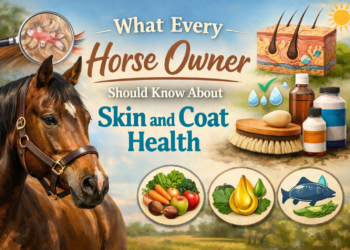Leopard geckos are fascinating creatures that make great pets. They are relatively easy to care for and have a varied diet that includes insects and other small prey. However, many pet owners may wonder if they can feed their leopard geckos lettuce.
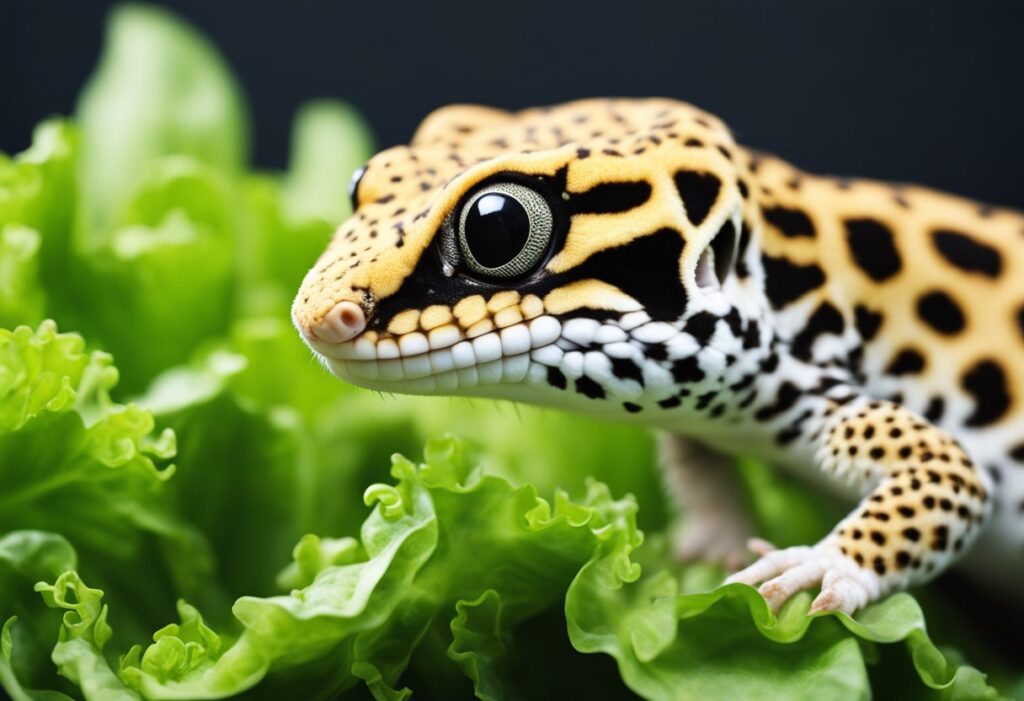
The short answer is no, leopard geckos should not eat lettuce. While lettuce is a common human food, it does not provide the necessary nutrients for leopard geckos to thrive. In fact, feeding your leopard gecko lettuce can lead to health problems such as diarrhea and malnutrition.
Instead, leopard geckos should be fed a diet that consists mainly of insects such as crickets and mealworms. It is also important to provide them with a calcium supplement to prevent metabolic bone disease. By providing your leopard gecko with a balanced diet, you can ensure that they live a long and healthy life.
Leopard Gecko Dietary Basics
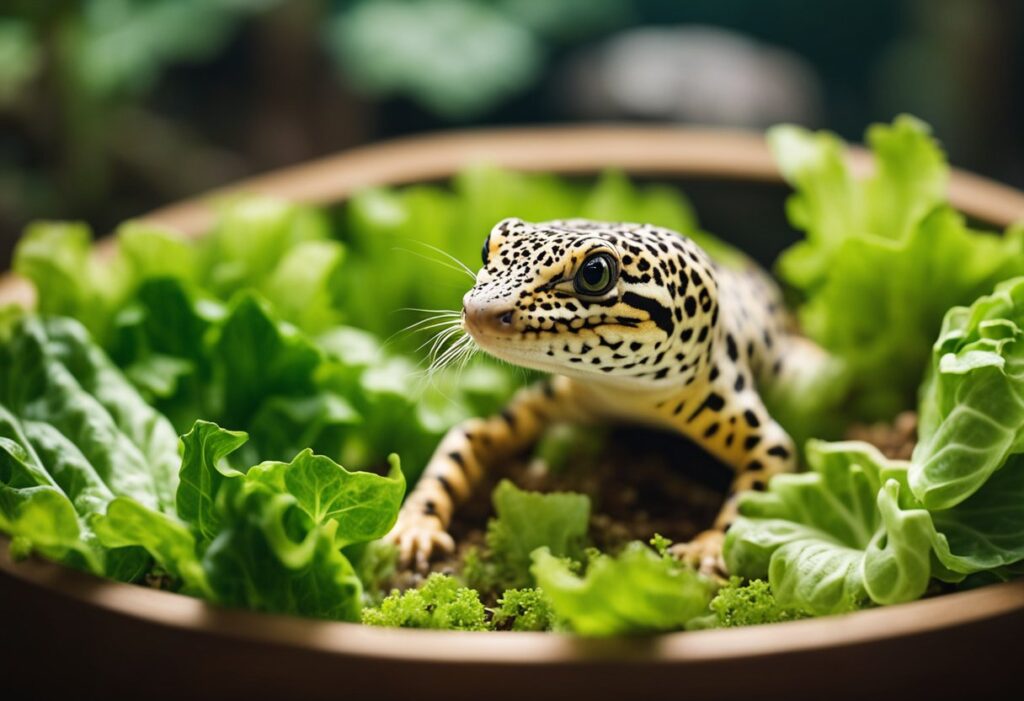
Leopard geckos are insectivores, which means they primarily eat insects. However, it is important to provide them with a well-balanced diet to ensure they receive all the necessary nutrients for their health and well-being.
Nutritional Requirements
Leopard geckos require a diet that is high in protein and low in fat. They also need calcium and vitamin D3 to maintain healthy bones and prevent metabolic bone disease. It is important to offer a variety of insects to provide a balanced diet. Some suitable insects include crickets, mealworms, waxworms, and roaches.
In addition to insects, leopard geckos can also be fed occasional treats such as pinkie mice, but these should not make up a significant portion of their diet. It is important to dust their food with a calcium supplement to ensure they are receiving enough calcium.
Feeding Frequency and Amount
Leopard geckos should be fed every day or every other day, depending on their age and size. Juvenile geckos require more frequent feedings than adults. It is important to monitor their weight and adjust their feeding schedule accordingly.
The amount of food offered should be based on the size of the gecko. A good rule of thumb is to offer as many insects as the gecko can eat in 10-15 minutes. It is important not to overfeed as this can lead to obesity and other health problems.
In conclusion, leopard geckos require a well-balanced diet that is high in protein and low in fat. Providing a variety of insects and occasional treats, along with a calcium supplement, will ensure they receive all the necessary nutrients for their health and well-being. Feeding frequency and amount should be based on the gecko’s age and size to prevent overfeeding and other health problems.
Risks of Feeding Lettuce to Leopard Geckos
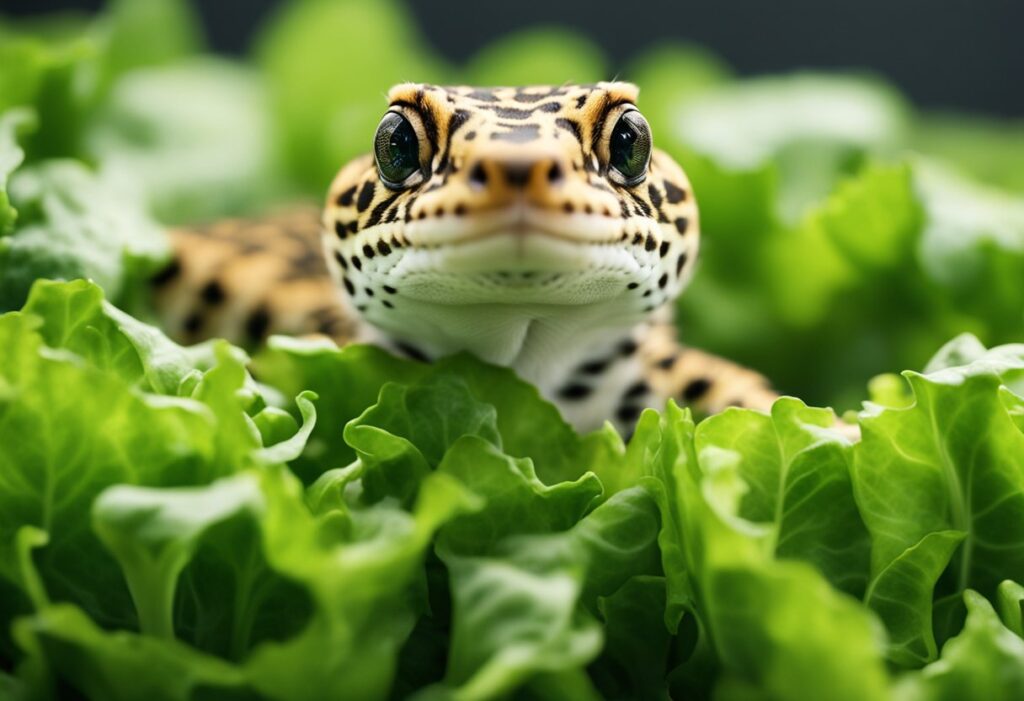
When it comes to feeding leopard geckos, it is important to provide them with a balanced diet that meets their nutritional needs. While lettuce may seem like a healthy option, it is not recommended as a staple food for leopard geckos. In fact, feeding too much lettuce to your leopard gecko can lead to several health risks.
Nutritional Deficiencies
Lettuce is primarily made up of water and contains very little nutritional value for leopard geckos. Feeding lettuce as a staple food can lead to nutritional deficiencies, including a lack of calcium, which can result in metabolic bone disease. This condition can cause deformities, fractures, and even death in severe cases.
Digestive Issues
Leopard geckos have a delicate digestive system that requires a balanced diet to function properly. Feeding lettuce to your leopard gecko can cause digestive issues such as diarrhea and constipation. This is because lettuce contains high amounts of water and fiber, which can be difficult for leopard geckos to digest.
In summary, while lettuce may seem like a healthy option for leopard geckos, it is not recommended as a staple food. Feeding too much lettuce to your leopard gecko can lead to nutritional deficiencies and digestive issues. It is important to provide your leopard gecko with a balanced diet that meets their nutritional needs to ensure their overall health and well-being.
Safe Foods for Leopard Geckos
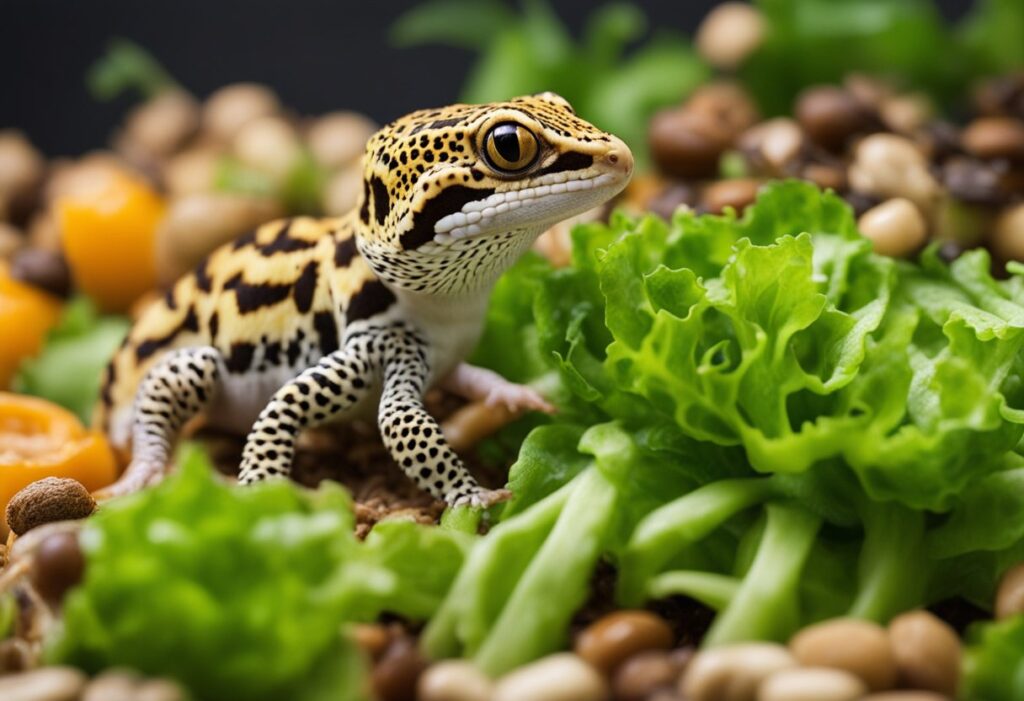
As responsible pet owners, we want to ensure that our leopard geckos are getting the proper nutrition they need to stay healthy. Providing a balanced diet is crucial to their overall well-being. In this section, we will discuss safe foods for leopard geckos.
Insects and Prey Items
Leopard geckos are insectivores, which means that their diet should consist mainly of insects and other prey items. Some safe options include crickets, mealworms, waxworms, and superworms. It is important to ensure that the insects are appropriately sized for your leopard gecko to prevent choking or other digestive issues.
It is also important to avoid feeding your leopard gecko wild-caught insects, as they may contain harmful pesticides or other toxins. Instead, purchase insects from a reputable supplier to ensure that they are safe and nutritious for your pet.
Supplements and Vitamins
In addition to a balanced diet of insects and prey items, leopard geckos may also require supplements and vitamins to ensure that they are getting all of the necessary nutrients. Calcium and vitamin D3 are especially important for maintaining healthy bones and preventing metabolic bone disease.
Supplements and vitamins can be added to your leopard gecko’s food or provided in the form of a dusting powder. Be sure to follow the recommended dosage instructions and consult with a veterinarian if you have any questions or concerns.
Overall, providing a balanced diet of safe foods, appropriate supplements, and vitamins is essential for maintaining the health and well-being of your leopard gecko.
Feeding Techniques and Tips
Live Prey Feeding
When feeding leopard geckos, it is important to offer live prey such as crickets, mealworms, and waxworms. These insects provide essential nutrients and help promote natural hunting behavior. It is recommended to offer prey that is smaller than the width of the gecko’s head to prevent choking hazards.
To ensure the best nutrition for your leopard gecko, we suggest gut-loading the insects before feeding. This means feeding the insects a nutritious diet before offering them to your gecko. This helps provide additional vitamins and minerals to your gecko’s diet.
Food Presentation
When feeding lettuce or any other vegetables to leopard geckos, it is important to chop them into small pieces to prevent choking hazards. We recommend offering vegetables as a treat in addition to their regular diet of live prey.
It is important to note that leopard geckos are primarily insectivores and should not rely on vegetables as their main source of nutrition. Offering a variety of live prey along with occasional vegetable treats will help provide a balanced diet for your gecko.
Overall, feeding leopard geckos requires a bit of effort and attention to detail, but with the right techniques and tips, it can be a rewarding experience for both you and your gecko.
Monitoring Your Leopard Gecko’s Health
Signs of a Balanced Diet
As responsible pet owners, we want to ensure that our leopard geckos are getting all the necessary nutrients they need to maintain good health. One of the best ways to ensure this is by monitoring their diet. A balanced diet for leopard geckos should consist of a variety of insects such as crickets, mealworms, and dubia roaches. It is important to note that leopard geckos are carnivores and should not be fed vegetables or fruits.
To ensure that your leopard gecko is getting a balanced diet, you can observe their behavior and physical appearance. A healthy leopard gecko should be active, alert, and have a good appetite. They should also have a plump tail and clear eyes. If your leopard gecko is not eating, has a sunken appearance, or has dull eyes, it may be a sign of an underlying health issue.
Common Health Concerns
Leopard geckos are generally hardy pets, but they can still develop health issues. Some common health concerns for leopard geckos include metabolic bone disease, respiratory infections, and parasitic infections. Metabolic bone disease is caused by a lack of calcium and vitamin D3 in their diet, which can lead to weak bones and deformities. Respiratory infections can be caused by a variety of factors such as improper temperature and humidity levels in their enclosure. Parasitic infections can be caused by unclean living conditions and can lead to weight loss, lethargy, and diarrhea.
It is important to regularly monitor your leopard gecko’s health and seek veterinary care if you notice any concerning symptoms. Proper husbandry and a balanced diet can help prevent many health issues in leopard geckos.
Frequently Asked Questions
What is the ideal diet for a leopard gecko?
A leopard gecko’s ideal diet consists of insects, such as crickets, mealworms, and Dubia roaches. Insects should be gut-loaded with nutritious foods and dusted with calcium and vitamin D3 supplements before being fed to your leopard gecko. It’s important to feed your leopard gecko the appropriate amount of insects based on their age and size.
Are there any vegetables that are safe for leopard geckos to consume?
Leopard geckos are primarily insectivores and do not require vegetables in their diet. However, some vegetables can be offered as an occasional treat, such as leafy greens like kale or collard greens. It’s important to remember that vegetables should not make up a significant portion of your leopard gecko’s diet.
Can leopard geckos have fruits, and if so, which ones?
Leopard geckos can have fruits as an occasional treat, but they should not make up a significant portion of their diet. Safe fruits include small amounts of mango, papaya, and figs. It’s important to remember that fruits are high in sugar and should be fed sparingly.
What are the best insect-based foods for leopard geckos?
The best insect-based foods for leopard geckos include crickets, mealworms, and Dubia roaches. These insects should be gut-loaded with nutritious foods and dusted with calcium and vitamin D3 supplements before being fed to your leopard gecko.
Are there common household foods that are suitable for leopard geckos?
No, common household foods are not suitable for leopard geckos. It’s important to stick to a diet of appropriately sized and gut-loaded insects and occasional treats of vegetables and fruits.
Is it safe for leopard geckos to eat cucumber or similar foods?
Cucumber and similar foods are not recommended for leopard geckos. These foods have a high water content and can cause digestive issues for leopard geckos. It’s best to stick to a diet of appropriate insects and occasional treats of vegetables and fruits.


